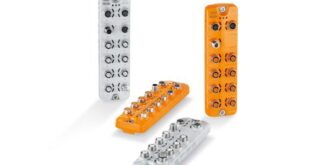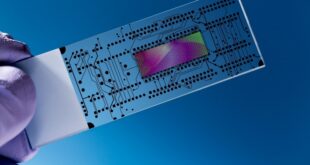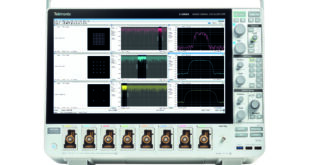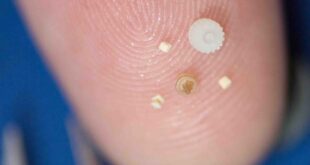More than 500 students, as well as local businesses, engaged in fascinating activities in and around the truck, helping to celebrate the world of engineering and inspire young people to enter the profession.
The week-long event took place from 2nd July, where Titan II offered visitors the chance to interact with numerous technologies used by engineers across industry, including the RS DesignSpark platform, Raspberry Pi, 3D printing, robotics, Internet of Things, virtual reality and augmented reality.
Pupils from King’s Cross Academy, Parliament Hill School and Christ Church School also had the chance to meet some of the engineers from the BrightSparks class of 2018 – the Electronics Weekly-RS initiative to celebrate the most talented electronic design engineers in the UK.
Mike England, Managing Director at RS, said: “The Year of Engineering is a truly commendable campaign that aims to help address the significant engineering skills shortage in the UK.
“At RS we are committed to promoting engineering to the young and so were delighted to use our innovation truck to support this campaign and help inspire the next generation of engineers.”
Government Envoy for the Year of Engineering, Stephen Metcalfe, said: “Engineering is a chance to innovate and shape the world around us, but not enough young people are aware of the opportunities a career in the industry could offer.
The Year of Engineering sets out to change this, giving young people inspiring, interactive experiences of this exciting career path and showing them what they could achieve as engineers.
“I was delighted to join students this week, alongside the Institute of Engineering and Technology, Camden Council, and local organisations and businesses, in visiting RS Components monster truck, packed with inspirational activities for the students.
“What a fantastic and original way for them to join us in celebrating the Year of Engineering, and capturing the imaginations of future engineers,” he added.
England concluded: “The event was a huge success, and all of those who boarded the truck were excited by the technology.
“We ran competitions offering students the opportunity to win a Raspberry Pi starter kit, and schools the chance to win tickets to attend the New Scientist Live show in September.
“In addition, our DesignSpark team ran interactive activities and showcased the recently launched platform DesignSpark Marketplace, which supports the buying and selling of maker-created products.”
The Institute of Engineering and Technology (IET) attended the event and ran the First Lego League demonstrations to encourage young people to enter the ultimate science and technology challenge.
Camden Council was also in attendance to highlight its STEAM (Science, Technology, Engineering, Arts and Maths) campaign, which aims to give local young people the best skills and opportunities so they can play a full part in the borough’s thriving creative, scientific and digital economy.
Another key supporter of the event was Argent, UK property developer and part of the King’s Cross Central Limited Partnership overseeing the regeneration project of King’s Cross.
Flexible platform for faster IoT-device development
RS Components has worked with Cypress Semiconductor Corp and MikroElektronika to create Clicker 2 for PSoC 6, the development kit for faster prototyping with Cypress’ PSoC 6 ultra-low-power microcontrollers (MCUs).Bridging the gap between expensive, power hungry application processors and low performance MCUs, PSoC 6 MCUs deliver advanced compute performance for energy-conscious devices like IoT endpoints or other small battery-powered objects.
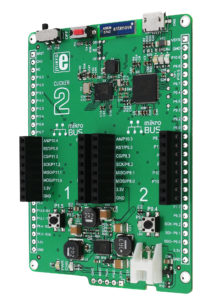
Its dual-core architecture combines an Arm Cortex M4 and an Arm Cortex M0+ on the same chip, delivering flexibility to assign tasks for optimum performance and power-efficiency. Its best-in-class flexible architecture enables interfacing with different types of sensors and creating custom interfaces.
Lightweight, state-of-the-art security based on trusted execution environment (TEE) provides protection including secure boot, secure data storage, and advanced cryptographic algorithms without the overhead of external memory or a secure element.
Developers can now quickly bring their PSoC 6 projects to life using the new Clicker 2 development kit, to be marketed exclusively through RS.
The board contains a PSoC 63 Connectivity Line device, which is Bluetooth® 5 compliant and simplifies interfacing with many different types of devices.
Two separate mikroBUS(TM) interface headers ensure ample expandability using MikroElektronika click boards. Literally hundreds of click boards are available, each with working example code, giving easy access to functions such as GSM, GPS/GNSS, motor control, sub-GHz or 2.4GHz radio, speech recognition, sensors, meters, LCD or OLED displays, and many more.
The option to add two click boards simultaneously to Clicker 2 for PSoC 6 doubles expandability and saves users making either-or decisions.
Aleksandar Mitrovic, MikroElektronika Product Marketing Manager, commented, “Clicker 2 is the ideal platform to begin PSoC 6 projects, combining ease of use, flexibility and economy.”
“The Clicker 2 for PSoC 6 marks our introduction into the flourishing MikroElektronika click board community utilising our PSoC 6 MCU solution, which is purpose-built for the IoT,” said Jim Davis, Marketing Director of the MCU Business Unit at Cypress. “In line with Cypress’ focus on solving problems for our customers to enable their next-generation products, we are expanding our reach into strong partner ecosystems, and RS and MikroElektronika are a perfect fit.”
“Working together with MikroElektronika and Cypress, we have addressed important engineering challenges for developers to ensure Clicker 2 for PSoC 6 provides the best possible kick-start for our customers’ projects,” said Andy Keenan, Vice President Category Management for Semiconductors and Passives at RS.
PSoC 6 is an ideal microcontroller for performance-conscious, energy-constrained IoT devices. It combines perfectly with the out-of-the-box simplicity and huge range of custom expansion options provided by MikroElektronika’s Clicker 2 platform and click boards.
18th Edition IET Wiring Regulations now in stock at RS Components
RS Components (RS) has stock availability of the 18th Edition of the IET Wiring Regulations – Requirements for Electrical Installations – co-published by the IET (Institution of Engineering and Technology) and BSI (British Standards Institution).
The IET Wiring Regulations, also known as BS 7671, are the UK standard for electrical installation and cover verification, inspection, testing, cable sizing, earthing and installation. JPEL/64, the national Wiring Regulations committee works closely with two major standard setting bodies: the IEC (International Electrotechnical Commission) and CENELEC (European Committee for Electrotechnical Standardization) to maintain and update the IET Wiring Regulations.
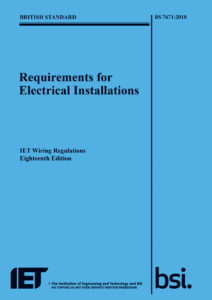
Significant changes in the 18th Edition Regulations include a new recommendation for arc fault detection devices (AFDDs) and a revised section on requirements for protection against overvoltage.
The first of these is the introduction of a new regulation that recommends the installation of AFDDs to mitigate the risk of fire in AC final circuits of a fixed installation due to the effects of arc fault currents.
The second is a completely revised section that focuses primarily on the requirements for the selection and implementation of surge protection devices (SPDs) to protect against transient overvoltage. The most significant technical change in this area refers to the selection requirements for the voltage protection level.
Other key changes in the regulations include: new requirements around residual current devices (RCDs); an extension of the scope of Section 753 to also apply to the area of embedded heating systems; significant changes to a section on electric vehicle (EV) charging installations; an entirely new section concerning onshore installations dedicated to the supply of inland navigation vessels; and the addition of a new appendix that focuses on energy efficiency design.
This latest edition of the Regulations, which comes into effect from January 2019, is a key publication for all professionals involved in the design, installation or maintenance of electrical wiring in buildings, and should be essential reading for electricians, electrical contractors and maintenance technicians, as well as being of significant interest to academic institutions.
Mark Coles, Head of Technical Regulations at the IET, commented: “The 18th Edition of the IET Wiring Regulations contains some significant changes to the way all electrical professionals are required to carry out their work to safeguard themselves and the public. With this in mind, it is essential that all electrical professionals ensure that they are up to speed with the new requirements.”
“Supporting professionals involved in electrical work is an important part of our business,” added Rashdeep Kelf, Senior Product Manager at RS. “We are making it easy for electrical engineers and technicians to quickly order their own copy of the new wiring regulations and, in conjunction with the launch, we are also introducing a wide selection of new products including VDE screwdrivers, digital multimeters, insulation testers and a range of RCD protection devices to help our customers comply with key changes in the regulations.”
 Engineer News Network The ultimate online news and information resource for today’s engineer
Engineer News Network The ultimate online news and information resource for today’s engineer

